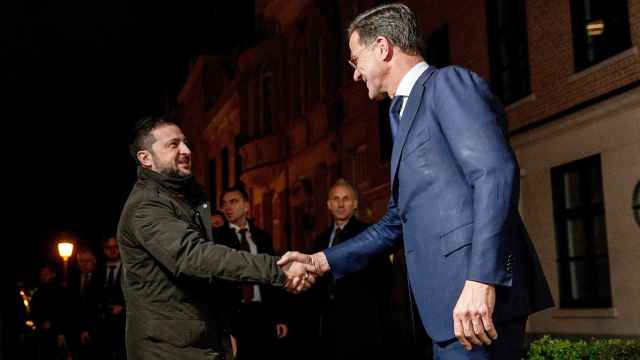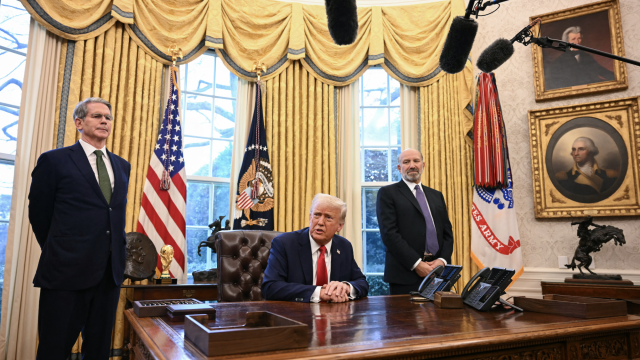Never mind Donald Trump and his bizarre fondness for Putin: Is there anyone who is more of a "Russian asset" in U.S. politics today than those who so eagerly call each other "agents of influence," "useful idiots" and mouthpieces for "Kremlin talking points?"
Hillary Clinton and her team have suggested recently that both Jill Stein, the Green Party presidential hopeful, and Tulsi Gabbard, perhaps the most unconventional candidate in the Democratic primaries, are being “groomed” by the Kremlin as spoiler candidates. Her evidence appears to be simply that the Russians “have a bunch of sites and bots and other ways of supporting her so far.”
This seems to be nothing but smear, and even Gabbard’s rivals in the race seem to be keeping away from this particular mud-bath. But it demonstrates a wider and worrying problem in Western and, above all, U.S. political discourse.
Beyond Trump
This is, in many ways, the whole Trump-as-Russian-agent business metastasized. There is no evidence that the Kremlin truly wanted Trump to be president, or even thought he could defeat Clinton. Rather, the Russians were terrified that Hillary Clinton, elected as president — which they thought was an inevitability — would adopt a hostile policy against them and perhaps even commit to bringing about regime change in Moscow. This may sound like paranoid nonsense to Western ears, but for many in Russia’s ruling circles, this was and remains a genuine fear.
Rather, they did everything they could to stir up trouble and light political brushfires, in the hope that the new president would be too busy dealing with them to launch any grand geopolitical crusades. And one of the best sources of trouble and combustion was Trump, whom they supported indirectly — as they did many other causes and individuals — as one more way of undermining President Clinton.
They got Trump, though, more because of Clinton’s poor campaign strategy and the idiosyncrasies of the U.S. political system than their limited and often clumsy propaganda. His crass rhetoric, constant policy flip-flops and blunt America First (and Trump First Of All) approaches have caused tensions and reverses for the West. Moscow’s glee, though, has been tempered with a sense of the risks and problems he means for them.
U.S. policy is, courtesy of a Democratic Congress that has seen punishing Russia as revenge for losing the White House, tougher on Russia than at any time since the collapse of the U.S.S.R., and shows no sign of changing. U.S. military spending continues to be exponentially higher than its Russian equivalent. European countries — fearing the loss of American protection — are being more serious about their security than ever since the Cold War.
The Kremlin knows it cannot challenge the West directly; it cannot force it to treat Russia as a superpower, or to grant it the privileges and status it feels it deserves. Instead, it is engaged in efforts to divide the West, to distract it and to demoralize it. In this political war, Moscow hopes to break the bonds of history, values and identity that hold the West together and woo, intimidate and bamboozle countries and leaders individually.
To this end, they seem to have stepped away from direct interference in elections, realizing that this is difficult, risky and often counter-productive. Instead, they are taking full advantage of the crises of legitimacy and identity afflicting the West — crises that Moscow in no way created — and magnifying the resulting internal discords and disagreements.
Doing Putin’s dirty work for him
In this context, Putin can rejoice in the actions of the latter-day witch-hunters who are forever spying Russian influence, Kremlin sympathies, useful idiocy and all-round Putinversteherdom.
By turning political debate into a hunt for traitors, it generates the very kind of toxic, suspicious political culture that undermines the bonds of solidarity and civility that underpin democratic societies. Instead, it peddles a vision of a world where conspiracy, treachery, corruption and deceit are the orders of the day, normalizing the very behaviors that they are calling out.
It is worth noting, after all, that the dig at Gabbard generated a furious and equally intemperate counter-attack, as she slammed Clinton as the “queen of warmongers” and the “embodiment of corruption.”
By delegitimizing alternative perspectives as "Kremlin talking points," it makes it harder to have the kind of serious, difficult conversations that are needed to address the serious challenges facing democracy and liberal capitalism.
There are real reasons why people may be unhappy, why they are turning to populism and nationalism, single-issue extremism and apathy. Telling them that it is because they are foolishly allowing a foreign power to define them, and that their views have no intrinsic merit, is not going to win friends or influence people.
By elevating Putin into the role of master puppeteer, able to bend minds and shape politics to his will, it gives him vastly more credit than he deserves, and contributes to the fears of those who argue that it is better to give him something of what he wants in the hope of satisfying him.
In short, without minimizing the impact of Russian efforts to poison Western debates, we need to recognize how our own toxic politics are often vastly more harmful and effective. The most "useful idiots" often turn out to be those who don't realize how much they are empowering their enemies.
A Message from The Moscow Times:
Dear readers,
We are facing unprecedented challenges. Russia's Prosecutor General's Office has designated The Moscow Times as an "undesirable" organization, criminalizing our work and putting our staff at risk of prosecution. This follows our earlier unjust labeling as a "foreign agent."
These actions are direct attempts to silence independent journalism in Russia. The authorities claim our work "discredits the decisions of the Russian leadership." We see things differently: we strive to provide accurate, unbiased reporting on Russia.
We, the journalists of The Moscow Times, refuse to be silenced. But to continue our work, we need your help.
Your support, no matter how small, makes a world of difference. If you can, please support us monthly starting from just $2. It's quick to set up, and every contribution makes a significant impact.
By supporting The Moscow Times, you're defending open, independent journalism in the face of repression. Thank you for standing with us.
Remind me later.








